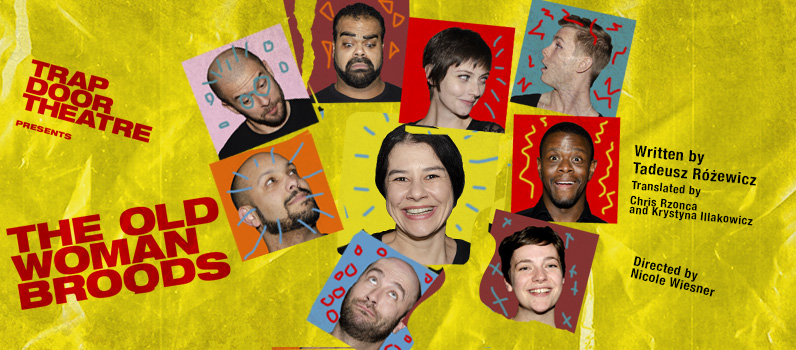
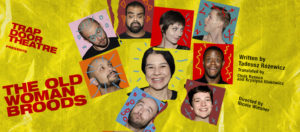 Highly Recommended **** In 1969, Polish playwright Tadeusz Różewicz wrote a drama that was essentially a live reading of a Twitter feed. The translation by Chris Rzonca and Krystyna Illakowicz emphasizes the similarities between information overload then and now, but the former anti-Nazi Resistance fighter’s anxiety regarding environmental catastrophe, encroaching violence, and dubious medical advice was oddly prescient. The experimental Trap Door Theatre has brought The Old Woman Broods to the Chicago stage through the directing of Nicole Wiesner, who is an expert in the non-naturalistic staging devices it takes to wring the power of each moment out of Różewicz’s difficult text. It’s a challenge because the moments build on each other through vague associations instead of flowing, but that’s part of what makes it so emblematic of the way we receive narratives today.
Highly Recommended **** In 1969, Polish playwright Tadeusz Różewicz wrote a drama that was essentially a live reading of a Twitter feed. The translation by Chris Rzonca and Krystyna Illakowicz emphasizes the similarities between information overload then and now, but the former anti-Nazi Resistance fighter’s anxiety regarding environmental catastrophe, encroaching violence, and dubious medical advice was oddly prescient. The experimental Trap Door Theatre has brought The Old Woman Broods to the Chicago stage through the directing of Nicole Wiesner, who is an expert in the non-naturalistic staging devices it takes to wring the power of each moment out of Różewicz’s difficult text. It’s a challenge because the moments build on each other through vague associations instead of flowing, but that’s part of what makes it so emblematic of the way we receive narratives today.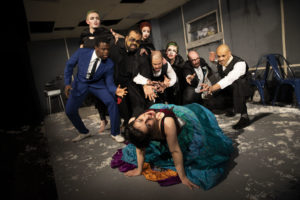
The Old Woman (Manuela Rentea) passes her days in a café where she is barely tolerated because she has nowhere else to be. But only for now, she declares, because through the miracles of modern medicine, women as old as eighty can have babies. “Everyone should have babies!” she declares, “men, too!” Whenever something happens within her earshot, she’s quick to blurt out an expert opinion, and she’s hardly alone in this. With her in the café are a snooty waiter (Michael Mejia-Beal) who regularly has meltdowns over news of ever-nearer droughts and wars, the invasive, self-help spouting urologist/fertility doctor (Carl Wisniewski), a triplicate young woman (Anna Klos, David Lovejoy, and Emily Nichelson) who debates with herself whether her gossip is meaningful, a blind man who has built a fragile new life only for it to slip away (Miguel Long), and a man who wages psychological warfare against flies (Dennis Bisto). A motley group, yet they somehow contain the whole world.
Our narrator (Keith Surney), reads the stage directions in an announcer’s voice, though Wiesner’s staging is mostly different for the sake of moving things along and establishing a disconnect between the disjointedness of what is seen and the narrative that is remembered. J. Michael Grigg’s scenic design is Spartan, allowing more room for complex choreography. This play demands big movements from all its actors, but especially from Rentea, whose Old Woman has the spry feistiness and coordination of a toddler. Indeed, at only seventy-five minutes, the play is at such a fever pitch throughout that it takes a lot of energy just to watch. There are quiet moments, mostly those featuring the original doo wop and folk music of Danny Rocket. But they still require the audience to be quick to accept when the play jumps off in a new direction and circles back to something unexpectedly. Characters shift rapidly between different situations, their identities shifting along the way, and that’s before the war finally arrives at the café all hell breaks loose.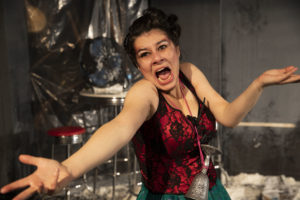
While the events are chaotic, the language of the play is straightforward enough that we have a lot to grasp onto. The characters watch apocalyptic dramas (that are done in a tidy, naturalistic style); “The Guardian of Law and Order” uses the familiar language of cable pundits to explain why horrific images are no big deal. The people compulsively consult their newspapers as if they were smartphones. Even the urologist’s breathless advice sounds similar to the ads that surround health-related articles. The Old Woman is oddly blasé about all this, assuring everyone that the solution to life’s problems is more life. She has no time for young people’s neuroses over little things like senseless slaughter, a lethally polluted environment, and despair for the future. Do kids today think they invented that? In a way, it’s oddly comforting to know that someone fifty years ago foresaw so many problems that seem distinctly contemporary, and the play does provide a welcome perspective on how addictive bad news is. But the from of Różewicz’s work is far from the most challenging thing about it.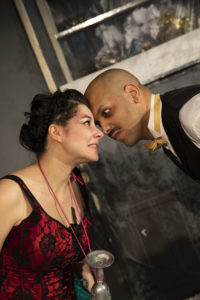
The Old Woman Broods runs through January 19, 2019, at Trap Door Theater, 1655 W Cortland, Chicago. Parking is available in the neighborhood.
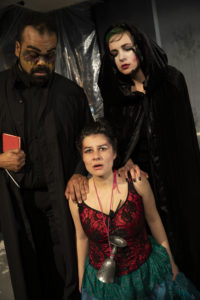 Running time is seventy-five minutes.
Running time is seventy-five minutes.
Performances are:
Thursdays: 8:00 pm
Fridays: 8:00 pm
Saturdays: 8:00 pm
Tickets are $20-25, with 2-for-1 admission of Thursdays.
To order, call 773-384-0494 or visit Trap Door Theatre.
To see what others are saying, go to Theater in Chicago, go to Review Round-Up and click at “The Old Woman Broods”.



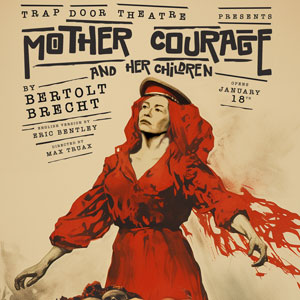


More Stories
“the distrikt of lake michigun”
“Mother Courage and Her Children” reviewed by Jacob Davis
“The Pillowman” reviewed by Frank Meccia